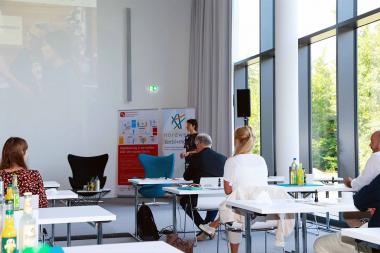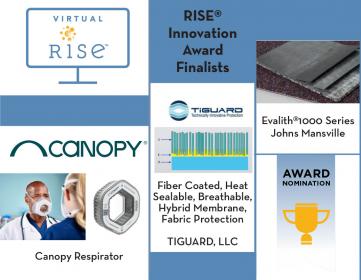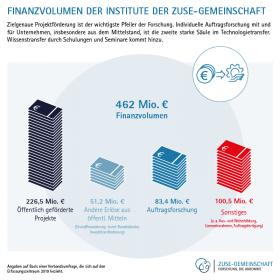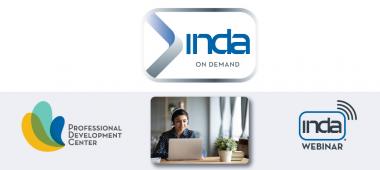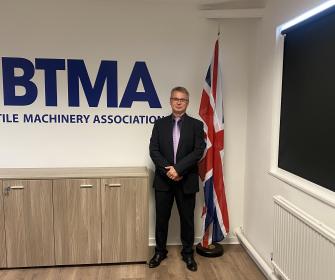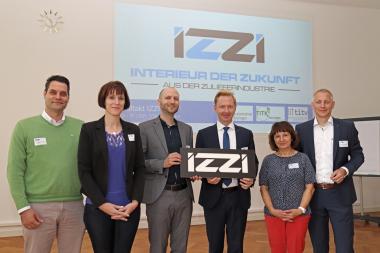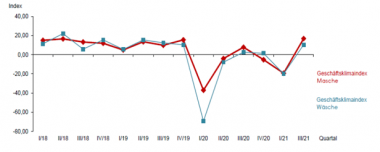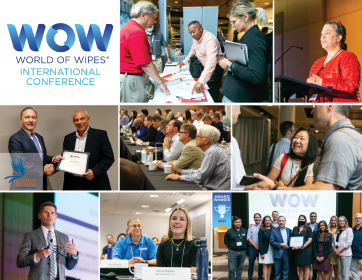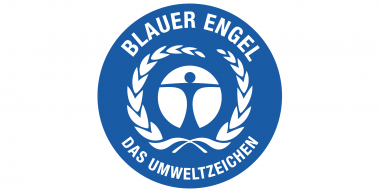Textil- und Modeindustrie: KMU investieren verstärkt in Digitalisierung
Das Mittelstand 4.0-Kompetenzzentrum Textil vernetzt begleitet mittelständische Unternehmen bereits im vierten Jahr bei der Umsetzung von Digitalisierungsstrategien. Seit seinem Start im November 2017 hat Textil vernetzt 62 Praxis-Projekte mit 60 Mittelständlern umgesetzt und davon im letzten Jahr 14 Projekte erfolgreich abgeschlossen. Wie gemeinsam die digitale Transformation gemeistert werden kann, wurde auf der vierten, hybrid durchgeführten Fachtagung des Mittelstand 4.0-Kompetenzzentrums Textil vorgestellt.
Das Corona-Virus wirkt als Technologie-Turbo. Unternehmen und Beschäftigte sind technisch deutlich besser ausgestattet als vor der Krise. Das ist das Fazit des Resilienz-Checks, einer GfK-Befragung im Auftrag von Microsoft Deutschland und der Bundesvereinigung der Deutschen Arbeitgeber (BDA). Demnach sagen 48 Prozent der Befragten, dass die Software-Ausstattung in ihrem Unternehmen ausgebaut wird. Aufgrund der Krise mussten 67 Prozent der Organisationen sich an neue Arbeitsweisen gewöhnen, was auch dazu führte, dass 53 Prozent der Unternehmen insgesamt flexibler arbeiteten.
„Die Digitalisierung ist gekommen, um zu bleiben und verändert den Alltag in Unternehmen enorm. Die veränderte Arbeitswelt verlangt Arbeitnehmern wie Arbeitgebern in ihrer Dynamik und Komplexität viel Flexibilität ab. Wie in vielen Lebensbereichen ist auch an dieser Stelle Zusammenhalt gefragt.“, so Anja Merker, Geschäftsführerin des Kompetenzzentrums Textil vernetzt.
Wie Unternehmen von der digitalen Transformation wirtschaftlich profitieren, Chancen erkennen und Herausforderungen meistern, diskutierten die Unternehmer Olaf Thiel von Delta T. und Jan Baden von druckprozess gemeinsam mit Frederik Cloppenburg, Leiter des Textil vernetzt-Schaufensters am Institut für Textiltechnik an der RWTH Aachen und Frank Siegel, Leiter Funktionsdruck und kundenindividuelle Fertigung am Sächsischen Textilforschungsinstitut. Neugierig bleiben, aktiv Unterstützung suchen und damit zusätzliche Innovationskraft ins Haus holen, ist das Fazit der Gesprächsrunde.
„Cloud Computing und Cyber Security sind wesentliche Bestandteile einer guten Digitalisierungsstrategie“, so Roland Hallau, Fachkoordinator IT-Sicherheit im Mittelstand-Digital Zentrum Chemnitz. Besonders für kleine und mittlere Unternehmen gehe es darum, zukunfts- und widerstandsfähig zu bleiben. Welche Hilfe hierbei Künstliche Intelligenz bietet, welche Daten Unternehmen für ihre ersten KI-Anwendungen nutzen können und was die Daten wert sind, wurde zum Abschluss der Fachtagung gezeigt.
Gesamtverband der deutschen Textil- und Modeindustrie e. V.


